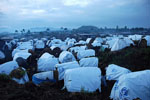
We’re nearing the end of 16 Days of Activism Against Gender Violence, an annual campaign to highlight sexual and gender-based violence as a human rights issue that stretches from November 25, the International Day for the Elimination of Violence Against Women, to December 10, International Human Rights Day. As part of the 16 Days campaign, Melanne Verveer, the U.S. Ambassador-at-Large for Global Women’s Issues, hosted a panel last week at the State Department in Washington, D.C. The overarching theme of the event was: gender-based violence is not “just a women’s issue;” it is a development, humanitarian, security, and economic issue, and it demands a response commensurate with its scope. As Ambassador Verveer stated, some of the most dangerous places in the world to be a woman are actually the most dangerous place to be, period.
Take eastern Congo, which has been called the most dangerous place to be a woman or girl because of the presence of armed groups and continued conflict. Women and girls bear the physical brunt of the violence in eastern Congo, but it is not solely women and girls who are targeted. Rape and sexual violence in eastern Congo is calculated and deliberate. It is a cheap and all-too-effective weapon of war and torture, used to tear communities apart at their core. It is a tactic to destroy and control entire populations. It is not just a women’s issue.
The panelists at the event spoke of their work addressing sexual and gender-based violence as a broader issue and about how they are working on strategies to involve men and boys in being part of the solution.
Anthony Porter is the co-founder of A Call to Men, a national organization that challenges men to reconsider long-held beliefs about women. He emphasized the importance of not only providing victims with services and holding perpetrators to account, but also of the critical need for prevention. At the end of the day, organizations can provide much-needed assistance to survivors, but attacks will continue until root causes are addressed. To do so, men need to find their voices and utilize their influence.
Dr. Nandini Azad is the president of Independent Commission for People’s Rights and Development in Karnataka and Rajasthan, India, an organization that educates young men and boys to raise awareness about gender-based violence through forums that they enjoy, such as cricket matches, bicycle rides, and street theater. She works to shift the paradigm so that the onus of combating sexual violence falls not just on women, but on entire communities and countries.
While neither panelist addressed the particular nature of sexual violence in eastern Congo, the key takeaway is that sexual violence cannot be looked at in a silo, no matter where in the world. It is part of a broader security, social, and political context that must be addressed from its root causes; systems have to be changed and incentives need to be altered depending on the context. But invariably, men and boys must be involved – they are more often than not the perpetrators, so how does one expect to solve a problem without changing the actions and belief systems of those committing the crimes?
In the case of eastern Congo, we must address sexual violence for what it truly is: a weapon of war that affects entire communities. Many organizations in North and South Kivu provinces provide life-saving services to thousands of women and conduct community outreach to educate male leaders on rape and the role that they can play in preventing sexual violence in their own communities. There are countless “good men” and women putting their lives on the line daily to provide, as Dr. Azad put it, the “heat at the bottom” through community outreach to shift attitudes and behaviors.
There is also a need for heat at the top, via political will and involvement. That is where activists and consumers here in the United States can play a role. By working in solidarity with Congolese to address root causes of sexual violence, we can help ensure that this weapon of war ceases to exist in eastern Congo —not “just” to the benefit of women but in the interest of communities and the wider region.
Photo: A camp for internally displaced people in North Kivu (Enough/Laura Heaton)

